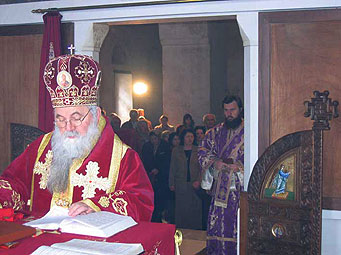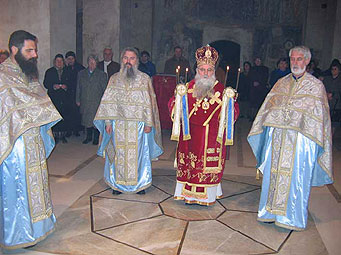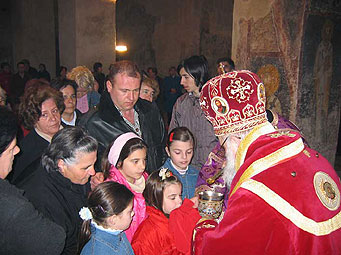Hierarch’s Divine Liturgy in the church of the Holy Sophia
(
21.03.2005
)

On the first Sunday of the Great Lent, Sunday of Orthodoxy, in Ohrid, Metropolitan Timothy of Debar, Kičevo, and Plaošnik celebrated Divine Liturgy in the ancient cathedral of the Holy Wisdom, our Saviour and Lord Jesus Christ, the Holy Sophia. At the Liturgy were present numberless faithful, who, preparing themselves with bodily fasting and arming themselves with spiritual fasting for progress in the spiritual fight of purification from passions, approached to partake of the Holy Mysteries of Christ. Chanters at the Liturgy in the Holy Sophia were the members of the male choir St. Clement of Ohrid, most of whom fervently approached to commune.
Metropolitan Timothy addressed the present faithful with an homily in which, along with the explanation about the victory of Orthodoxy and its celebration on this first Sunday of the Great Lent, he briefly tackled the Christian duties, which ought to be the life of every Christian. In the homily the Metropolitan underlined:
 “It is not easy indeed to forgive the ones who hinder our plans, in the sphere of our work, when we expect success. Nevertheless, the attitude of unforgiving is not in conformity with the Christian outlook on man’s personal relations with his fellowmen. Lord Jesus Christ recommends we have yet another love along with the love for God and for our beloved ones. He says: ‘Love your enemies, bless those who curse you, do good to those who hate you, and pray for those who spitefully use you and persecute you’ (Matt.
“It is not easy indeed to forgive the ones who hinder our plans, in the sphere of our work, when we expect success. Nevertheless, the attitude of unforgiving is not in conformity with the Christian outlook on man’s personal relations with his fellowmen. Lord Jesus Christ recommends we have yet another love along with the love for God and for our beloved ones. He says: ‘Love your enemies, bless those who curse you, do good to those who hate you, and pray for those who spitefully use you and persecute you’ (Matt.
We must be attentive to people. Let us not lead people to insult us, let us measure out our behaviour to others. If we notice that our brother is showing certain discontent by our attitude toward him, despite the fact that we think he is wrong, let us use here as well, for the sake of the peace between us and for our personal benefit, the counsel of our Lord Jesus Christ: ‘Therefore if you bring your gift to the altar, and there remember that your brother has something against you, leave your gift there before the altar, and go your way. First be reconciled to your brother, and then come and offer your gift’ (Matt.
Without mutual forgiveness, God will not receive our prayers and sacrifices. Forgiveness should not be only oral, but also in deed. You also ought to fully erase from your heart the insults, as if they never existed. In that case the merciful Heavenly Father will erase from the notebook your trespasses and sins, but only if you sincerely repent and pray for forgiveness. If you do thus, after the mutual forgiveness, you will feel great relief in your soul and immense spiritual joy”.
On this first Sunday of the holy Lent, the Orthodox Church in its cycle of worship has placed the memory of the victory of Orthodoxy over iconoclasm. It is the final victory over the heresy of persecution of icons, which under the protection by the emperors iconoclasts spread in the course of the 8th and in the beginning of the 9th centuries throughout the  confirmed this with their own life as well. In these persecutions the Christians who remained in orthodox reverence of icons hid them devoutly before their destroyers. Wonderful and wonder-working icons in the time of the heresy were devotedly hidden, and some of them by God’s grace have been preserved in a miraculous way. The Seventh Ecumenical Council in Nicea (787 AD) with church canons regulated the reverence of icons (“The honour given to the image portrayed on the icon is transmitted to the Archetype, and he who venerates the icon, venerates the person painted on it”, it says among other things in the concilliar resolution of the Fathers in response to the doubts of the heretics, who under certain influences by Monophysitism and Islam considered icons unseemly to Christianity). Nonetheless, in the beginning of the 9th century, owing to the policy of some of the Byzantine emperors, who in that time quickly changed on the throne in
confirmed this with their own life as well. In these persecutions the Christians who remained in orthodox reverence of icons hid them devoutly before their destroyers. Wonderful and wonder-working icons in the time of the heresy were devotedly hidden, and some of them by God’s grace have been preserved in a miraculous way. The Seventh Ecumenical Council in Nicea (787 AD) with church canons regulated the reverence of icons (“The honour given to the image portrayed on the icon is transmitted to the Archetype, and he who venerates the icon, venerates the person painted on it”, it says among other things in the concilliar resolution of the Fathers in response to the doubts of the heretics, who under certain influences by Monophysitism and Islam considered icons unseemly to Christianity). Nonetheless, in the beginning of the 9th century, owing to the policy of some of the Byzantine emperors, who in that time quickly changed on the throne in
After the great unrests and mass turmoil, the empress Theodora and the Constantinopolitan patriarch Methodius received help from God to put an end to the heresy, and so they reinstated and finally canonised the reverence of icons on